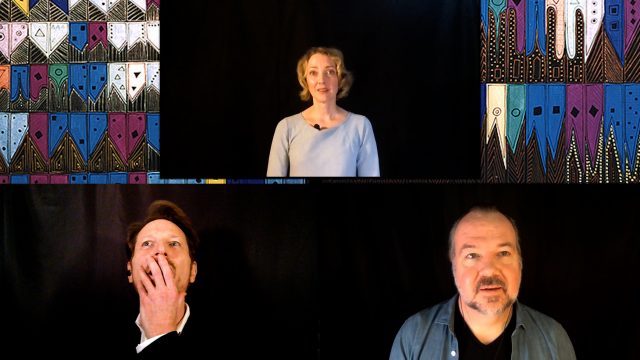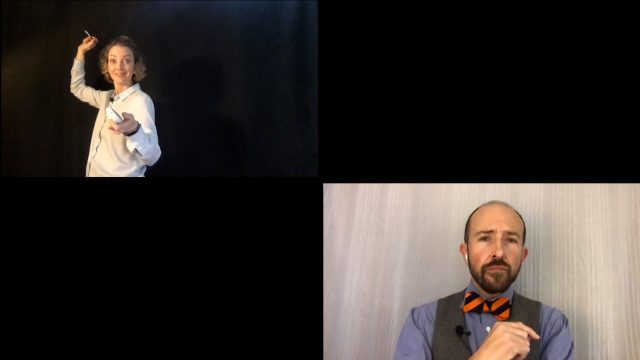
Dr. Bruce Miller (Leo Marks) meets with Anne Adams (Lucy Davenport) and her husband, Robert (Rob Nagle), in Jake Broder’s UnRavelled (photo by Corwin Evans)
UNRAVELLED
The Global Brain Health Institute / Trinity College Dublin
Available on demand through April 30, free
www.gbhi.org/unravelled
One of the most fascinating plays of the Zoom era comes to us from an unlikely source: the Global Brain Health Institute at the University of California, San Francisco. Jake Broder’s UnRavelled is a deeply affecting ninety-minute play that shares the true story of Canadian scientist Anne Adams, who, in 1994, at the age of fifty-three, became obsessed with Maurice Ravel’s “Bolero” and made a remarkable painting based on the 1928 musical work, which Ravel composed for dancer Ida Rubenstein in 1928, when he was fifty-three. As it turns out, both Adams and Ravel had the same serious brain disease that affects memory while lighting a creative fuse.
Directed by Nike Doukas and edited by Corwin Evans in Zoom boxes, UnRavelled stars Lucy Davenport as Anne, a mathematician, chemist, and biologist, and Rob Nagle as her husband, Robert, a traffic architectural engineer. They are trying to hold together following a serious accident involving their son, but when they continue to have trouble communicating and Anne starts spending more time by herself in her studio, listening to “Bolero” and painting, Robert begins to suspect something else is going on, and Dr. Bruce Miller (Leo Marks) ultimately confirms that.
Doukas cuts between the current reality, in color, and Anne’s imaginary conversations with Ravel (Conor Duffy) about art, love, and science, usually in black-and-white. The play not only traces the intricate details of Anne’s illness but the effects it has on Robert, a gentle, caring man whose world has also been turned upside down. Prior to her submersion into “Bolero,” Anne is painting strawberries over and over, which upsets Robert. “You aren’t a painter,” he tells her. Anne responds, “You’re going to tell me what I can and can’t do?” Robert: “You’d be wasting your gifts, your experience in your field. And you will leave the world a poorer place, let alone our family.” Anne: “You don’t get to take a spiritual high ground. . . . I don’t need my choices mansplained to me, thank you. . . . I’m stopping to paint strawberries for a while, but that should be all I have to say.” Robert: “Yes, that’s true if you were some normal person and it didn’t matter, but you’re not and it does.” Later, after Anne considers leaving her chair at the university, Robert says to himself, “Seriously, who are you and what have you done with my wife?”

Anne Adams (Lucy Davenport) and Maurice Ravel (Conor Duffy) have something in common in fascinating new play (photo by Corwin Evans)
Broder includes interstitial scenes in which Dr. Miller, a neurologist who becomes Anne’s physician, is giving an intriguing lecture about modern art, while Ravel also speaks with Rubenstein (Melissa Greenspan), who has commissioned “Bolero,” which Ravel detests and can’t believe he actually wrote. “It just dumped itself into my lap all at once,” Ravel tells Anne. “At the premiere, the crowd roared. And I knew that this would be the first line of my obituary, and there is not a note of music in it.” The merging of the different aspects of science and the artistic process in the two distinct time periods works well as more information comes out about Anne’s condition. Nagle stands out among the cast, representing a kind of everyperson suddenly having to face a difficult, unexpected situation that he can’t control; he’s the character the audience can most identify with. The power of the play, which features the London Symphony Orchestra’s version of “Bolero” as well as French pianist Pierre-Laurent Aimard performing Ravel’s “Jeux d’eau, M.30,” lies in how it develops organically, like a work of art or, sadly, an untreatable disease.
Copresented by GBHI and Trinity College Dublin, UnRavelled is streaming for free through April 30. In conjunction with the play, there are several talkbacks and panel discussions available on demand, with Broder (Our American Hamlet, His Royal Hipness Lord Buckley), Doukas UnRavelled (Red Ink, The Hothouse), GBHI codirector and UCSF Memory and Aging Center director Miller, neurologists Bill Seeley and Adit Friedberg, neuroscientist Francesca Farina, theater and dementia specialist Nicky Taylor, GBHI alumni relations manager Camellia Latta, as well as a related dance choreographed by Magda Kaczmarska.